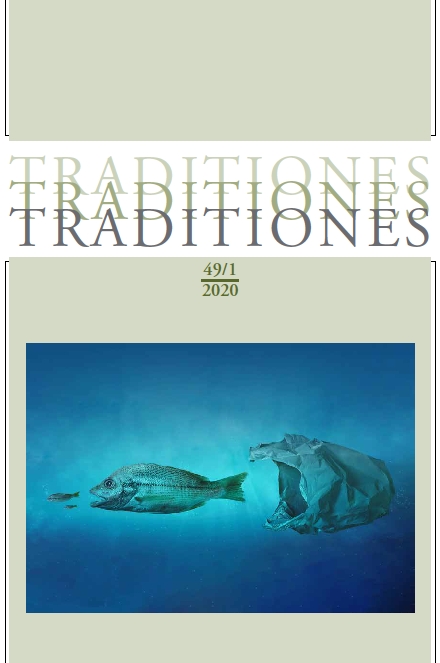Spremembe od spodaj
Primerjalna raziskava množičnih gibanj za zmanjšanje količine odpadkov in spodbujanje kolesarjenja
DOI:
https://doi.org/10.3986/Traditio2020490104Ključne besede:
množična gibanja, ravnanje z odpadki, urbano kolesarjenje, Ljubljana, Beograd, BudimpeštaPovzetek
Avtorja se posvečata dvema okoljevarstvenima gibanjema, ki sta vzniknili iz ljudskih iniciativ. Prvi so Ekologi brez meja, v Sloveniji vodilna nevladna organizacija, usmerjena k zmanjšanju količine odpadkov, drugi pa Kritična masa, mednarodno gibanje kolesarjev, ki si prizadeva povečati površine namenjene urbanim kolesarjem. Raziskovanje slednjih je potekalo v Beogradu in Budimpešti. Etnografska analiza kaže, da sta gibanji imeli mnoge podobne izkušnje. S pomočjo vzorčnih primerov postavljata avtorja pod drobnogled družbene tranzicije, ki jih tovrstna gibanja podpirajo, in osvetlita, kako ta gibanja vzniknejo, delujejo in se sčasoma spreminjajo.
Prenosi
Literatura
Amagoh, Francis. 2015. Improving the Credibility and Effectiveness of Non-Governmental Organizations. Progress in Development Studies 15: 221–239. DOI: https://doi.org/10.1177/1464993415578979.
Andreasen, Alan. 1995. Marketing Social Change: Changing Behaviour to Promote Health, Social Development, and the Environment. San Francisco: Jossey-Bass.
Ball, Philip. 2005. Critical Mass: How One Thing Leads to Another. New York: Farrar, Straus and Giroux.
Carlsson, Chris (ed.). 2001. Critical Mass: Bicycling’s Defiant Celebration. Edinburgh and Oakland: AK Press.
DeWalt, Kathleen, and Billie DeWalt. 1998. Participant Observation. In: Russell Bernard (ed.), Handbook of Methods in Cultural Anthropology. Walnut Creek: Altamira Press, 259–299.
Eldredge, Niles, and Stephen Jay Gould. 1972. Punctuated Equilibria: An Alternative to Phyletic Gradualism. In: Thomas Schopf (ed.), Models in Paleobiology. San Francisco: Freeman Cooper, 82–115.
Fikfak, Jurij et al. (eds.). 2004. Qualitative Research: Different Perspectives, Emerging Trends. Ljubljana: Založba ZRC; Mainz: Universitaet Mainz.
Gersick, Connie. 1991. Revolutionary Change Theories: A Multilevel Exploration of the Punctuated Equilibrium Paradigm. The Academy of Management Review 16: 10–36. DOI: https://doi.org/10.5465/AMR.1991.4278988.
Gingrich, Andre. 2012. Comparative Methods in Socio-Cultural Anthropology Today. In: Richard Fardon et al. (eds.), The SAGE Handbook of Social Anthropology. London: SAGE, 211–222.
Gladwell, Malcolm. 1991. The Tipping Point: How Little Things Can Make a Big Difference. Boston: Little, Brown.
Glaser, Barney, and Anselm Strauss. 1967. The Discovery of Grounded Theory: Strategies for Qualitative Research. New York: Aldine de Gruyter.
Granovetter, Mark. 1978. Threshold Models of Collective Behavior. The American Journal of Sociology 83: 1420–1443. DOI: https://doi.org/10.1086/226707.
Greiner, Larry. 1972. Evolution and Revolution as Organizations Grow. Harvard Business Review 50 (4): 37–46. Available at: https://hbr.org/1998/05/evolution-and-revolution-as-organizations-grow.
Grodzins, Morton. 1957. Metropolitan Segregation. Scientific American 197 (4): 33–47. Available at: https://www.jstor.org/stable/e24941935.
Grodzins, Morton. 1958. The Metropolitan Area as a Racial Problem. Pittsburgh: University of Pittsburgh Press.
Howell, Jane, and Boas Shamir. 2005. The Role of Followers in the Charismatic Leadership Process: Relationships and Their Consequences. Academy of Management Review 30: 96–112. DOI: https://doi.org/10.5465/AMR.2005.15281435.
Hudson, Cristopher. 2000. From Social Darwinism to Self-Organization: Implications for Social Change Theory. Social Service Review 74 (4): 533–559. DOI: https://doi.org/10.1086/516424.
Kamaria, Kinyua, and Alfred Lewis. 2009. The Not-For-Profit General Management Responsive Capability Competencies: A Strategic Management Perspective. Business Strategy Series 10 (5): 296–310. DOI: https://doi.org/10.1108/17515630910989196.
Kuhn, Thomas. 1970. The Structure of Scientific Revolution. Chicago: University of Chicago Press.
Ličen, Daša (interviewer), and Thomas Hylland Eriksen (interviewee). 2016. On the Anthropology of Climate Change. A Conversation with Thomas Hylland Eriksen. Eurozine, February 9. Available at: http://www.eurozine.com/on-the-anthropology-of-climate-change/.
McMurray, Adela et al. 2010. Leadership, Climate, Psychological Capital, Commitments, and Wellbeing in a Non-Profit Organization. Leadership & Organization Development Journal 31 (5): 436–457. DOI: https://doi.org/10.1108/01437731011056452.
Miller, John, and Scott Page. 2004. The Standing Ovation Problem. Complexity 9 (5): 8–16. DOI: https://doi.org/10.1002/cplx.20033.
Norcliffe, Glen. 2015. Critical Geographies of Cycling: History, Political Economy and Culture. Surrey: Ashgate Publishing Company.
Perc, Matjaž et al. 2013. Evolutionary Dynamics of Group Interactions on Structured Populations: A Review. Journal of the Royal Society: Interface 10. DOI: https://doi.org/10.1098/rsif.2012.0997.
Podjed, Dan, and Daša Ličen. 2019. Orgunity as a New Form of Cooperation: Case Studies of Two Environmental NGOs. In: Peter Simonič (ed.), Anthropological Perspectives of Solidarity and Reciprocity. Ljubljana: Ljubljana University Press, Faculty of Arts, 189–208.
Podjed, Dan, and Rajko Muršič. 2008. Dialectical Relations between Professionals and Volunteers in a Biodiversity Monitoring Organisation. Biodiversity and Conservation 17 (14): 3471–3483. DOI: https://doi.org/10.1007/s10531-008-9443-z.
Puđak, Jelena. 2014. Koga briga za klimu? K sociologiji klimatskih promjena. Zagreb: Institut društvenih znanosti Ivo Pilar.
Quarter, Jack, and Betty Jane Richmond. 2011. Accounting for Social Value in Nonprofits and For-Profits. Nonprofit Management and Leadership 12 (1): 75–85. DOI: https://doi.org/10.1002/nml.12106.
Sarros, James et al. 2011. Leadership Vision, Organizational Culture, and Support for Innovation in Not-For-Profit and For-Profit Organizations. Leadership & Organization Development Journal 32 (3): 291–309. DOI: https://doi.org/10.1108/01437731111123933.
Schelling, Thomas. 1971. Dynamic Models of Segregation. Journal of Mathematical Sociology 1: 143–186. DOI: https://doi.org/10.1080/0022250X.1971.9989794.
Schuller, Mark, and David Lewis. 2014. Anthropology of NGOs. In: John Jackson (ed.), Oxford Bibliographies in Anthropology. Oxford: Oxford University Press.
Tarnow, Eugen. 1996. Like Water and Vapor: Conformity and Independence in the Large Group. Behavioral Science 41 (2): 136–151. DOI: https://doi.org/10.1002/bs.3830410204.
Turner, Victor. 1969. The Ritual Process: Structure and Anti-structure. Chicago: Aldine.
Tushman, Michael, and Elaine Romanelli. 1985. Organizational Evolution: A Metamorphosis Model of Convergence and Reorientation. Research in Organizational Behavior 7: 171–222. DOI: https://doi.org/10.2307/256669.
Wehr, Kevin. 2009. Hermes on Two Wheels: The Sociology of Bicycle Messengers. Lanham: University Press of America.
Prenosi
Objavljeno
Kako citirati
Številka
Rubrike
Licenca

To delo je licencirano pod Creative Commons Priznanje avtorstva-Nekomercialno-Brez predelav 4.0 mednarodno licenco.
Avtorji jamčijo, da je delo njihova avtorska stvaritev, da v njem niso kršene avtorske pravice tretjih oseb ali kake druge pravice. V primeru zahtevkov tretjih oseb se avtorji zavezujejo, da bodo varovali interese založnika ter da bodo povrnili morebitno škodo.
Podrobneje v rubriki: Prispevki






